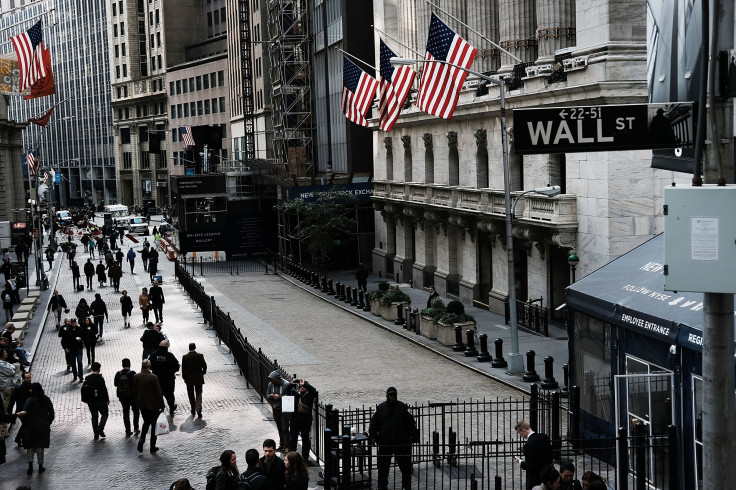Monday's Stock Market Open: US Equities Fall Despite Fed’s New Asset Purchase Program

KEY POINTS
- NYSE closed its trading floor due to coronavirus and moved to all-electronic trading
- The Federal Reserve began unlimited asset purchase program
- Economists predict huge GDP contraction in second quarter
Update: 12:05 p.m. EDT:
U.S. stocks incurred deeper losses by noon on Monday.
The Dow Jones Industrial Average dropped 774.99 points to 18,398.99, while the S&P 500 fell 92.62 points to 2,212.30 and the Nasdaq Composite Index dropped 169.54 points to 6,702.98.
In Europe markets finished lower as Britain’s FTSE-100 fell 4.48%, France’s CAC-40 dropped 4.22% and Germany’s DAX tumbled 3.17%.
Original story:
U.S. stocks opened lower on Monday despite the Federal Reserve launching an aggressive new intervention to support financial markets.
The Dow Jones Industrial Average dropped 328.19 points to 18,845.79, while the S&P 500 fell 35.73 points to 2,269.19 and the Nasdaq Composite Index dropped 34.76 points to 6,844.75.
The New York Stock Exchange has closed its trading floor due to coronavirus and temporarily move to all-electronic trading on Monday.
The Federal Reserve said on Monday it will introduce a flurry of new programs, including a commitment to continue its asset purchasing program “in the amounts needed to support smooth market functioning and effective transmission of monetary policy to broader financial conditions and the economy.”
“The coronavirus pandemic is causing tremendous hardship across the United States and around the world. Our nation’s first priority is to care for those afflicted and to limit the further spread of the virus,” the Fed said in a statement. “While great uncertainty remains, it has become clear that our economy will face severe disruptions. Aggressive efforts must be taken across the public and private sectors to limit the losses to jobs and incomes and to promote a swift recovery once the disruptions abate.”
“Fed policy is shifting into a higher gear to try to help support the economy which looks like it is in freefall at the moment,” wrote Chris Rupkey, chief financial economist at MUFG Union Bank. “The central bank is shifting from being not just the lender of last resort, but now it is the buyer of last resort. Don’t ask how much they will buy, this is truly QE infinity.”
Democrats blocked passage of a fiscal stimulus bill on Sunday in the Senate, citing it failed to sufficiently protect workers’ jobs and offered too much in bailouts to corporations.
National Economic Council Director Larry Kudlow said on Saturday that the economic stimulus package will amount to more than $2 trillion. On Sunday, Treasury Secretary Steven Mnuchin said financing programs to stimulate the economy may be worth up to $4 trillion.
“When this started, this was a bit unique to the airline industry since we had shut down most of airline travel,” Mnuchin said. “This liquidity facility is a broad-based liquidity facility working with the Fed.”
The number of confirmed coronavirus cases has now exceeded 350,000, with more than 15,000 deaths. The number of cases in the U.S. has reached at least 27,000.
New York Gov. Andrew Cuomo said on Sunday cases in the state reached more than 15,168.
President Donald Trump on Sunday activated the National Guard in California, New York and Washington state to fight the spread of the coronavirus.
The economic impact from the virus will be huge.
Economists at Goldman Sachs said they expect a 24% shrinkage in U.S. gross domestic product for the second quarter after a 6% decline in the first quarter. But Morgan Stanley economist Ellen Zentner warned on Sunday she expects a massive 30% contraction in the second quarter.
Federal Bank of St. Louis President James Bullard said the unemployment rate may hit 30%.
“Suffice to say that the economy entered a unique, sudden-stop recession in March,” wrote Prajakta Bhide, strategist at MRB Partners. “If there is no concrete evidence of meaningful progress toward controlling the epidemic in the next eight weeks, there will be no basis for people and businesses to feel safe to begin to normalize economic activity.”
“Things will get worse before they get better and the markets will continue to reflect that reality,” said Marc Chaikin, CEO of Chaikin Analytics. “This means that a bottoming process will take more time and probably inflict more damage to equities.”
“If short-term shutdowns lead to business defaults, closures, and permanent layoffs, the damage to corporate earnings growth could persist well after the virus is contained,” warned David Kostin, Goldman Sachs's top U.S. equity strategist.
“As difficult as it is to sit in cash, that’s certainly what I’m doing,” said Brian Quartarolo, portfolio manager at Pilgrim Partners Asia. “I’m presently in New York, and the fear is palpable -- it’s rising and there doesn’t seem to be anyone who thinks that this virus effect is anywhere near peaking yet, particularly here in the States.”
Overnight in Asia, markets were mixed. China’s Shanghai Composite fell 3.11%, while Hong Kong’s Hang Seng dropped 4.86%, and Japan’s Nikkei-225 jumped 2.02%.
In Europe markets traded lower as Britain’s FTSE-100 fell 1.68%, France’s CAC-40 dropped 0.88% and Germany’s DAX slipped 0.87%.
Crude oil futures gained 0.75% at $22.80 per barrel, Brent crude dropped 2.71% at $26.25. Gold futures gained 2.51%.
The euro rose 0.56% at $1.0756 while the pound sterling slipped 0.21% at $1.614.
© Copyright IBTimes 2024. All rights reserved.



















